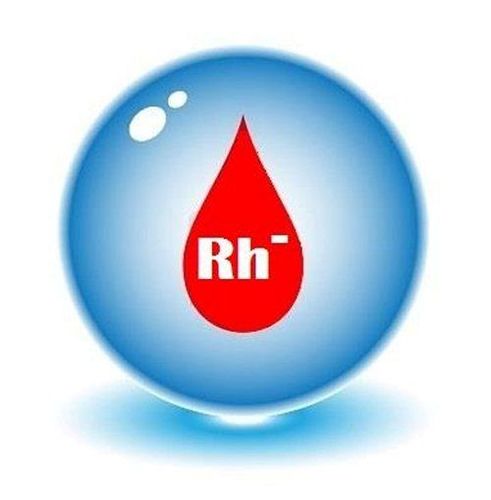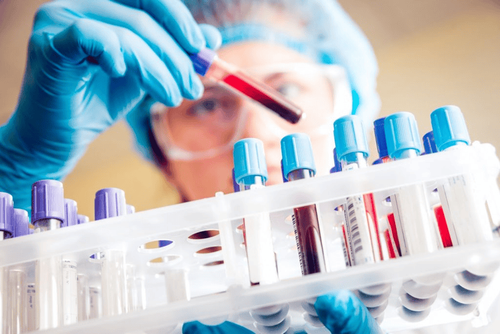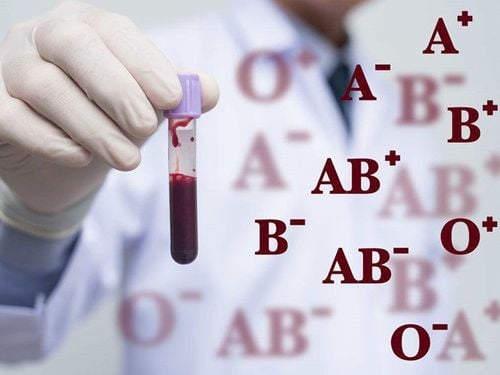This is an automatically translated article.
The article was professionally consulted with Specialist Doctor II Lai Thi Nguyet Hang - Obstetrician and Gynecologist - Department of Obstetrics and Gynecology - Vinmec Ha Long International General Hospital.Rh negative blood group is a rare blood group that only occurs in about 0.1% of the population, not only affecting blood transfusion, but mothers with this blood type also have a risk of having blood group incompatibility with their children and many other risks. affect infant health. To control these risk factors well, some tests are done.
1. Why is it important to note that mothers with Rh negative blood type during pregnancy?
The Rh blood group system is one of the most important blood group systems other than the ABO system. The Rh blood group system works together with the other blood group systems, which are divided into Rh positive and Rh negative blood groups.People with Rh-positive blood group have a protein known as antigen D on the surface of their red blood cells. People who don't have this protein (antigen D) are called Rh-negative people. This is a rare blood type, the percentage of people carrying this blood type system is about 0.1%. In addition to this blood group problem associated with blood transfusion, the problem is notable when an Rh (-) mother becomes pregnant. Because in some cases, when fetal blood circulates in the mother's blood, the mother's blood immediately receives antigen D on the surface of red blood cells and produces antibodies to fight this protein. Thus, the following problems will occur:
When antibodies appear, in the first pregnancy there is no danger to the fetus. Entering the second pregnancy onwards, if not treated early, the mother's blood circulating anti-antigen D antibodies will cause great risks. There can be two cases: If the fetus has Rh negative blood type. does not affect the health of the fetus. In the next pregnancy, if the fetus is Rh (+), maternal antibodies can cross the placenta and attack the fetal red blood cells, causing hemolytic anemia, jaundice, severe heart failure and liver failure. This condition is called hemolysis of the newborn. Fetal anemia will get worse in future pregnancies and can cause miscarriage. Cases during pregnancy that fetal blood can enter the maternal blood circulation to create antibodies such as:
Fetal blood will definitely enter the maternal circulation in the following cases: At birth, especially after birth cesarean section or manual hysterectomy. Some situations with risk of entering the blood circulation include: Termination of pregnancy such as medical or surgical abortion. Ectopic pregnancy . Threatened miscarriage. Vaginal bleeding or miscarriage after 12 weeks. Pregnant mothers with Rh (-) blood group are at high risk of abnormal vaginal bleeding, so they need to be carefully monitored. Perform invasive procedures such as conducting chorionic villus sampling, amniocentesis to check for fetal malformations, umbilical cord blood puncture. External fetal rotation.

2. What tests should be done if the mother is Rh negative?
Tests that need to be done during pregnancy include:The mother must first have a blood test to determine the blood type. Rh blood group test at reputable sites to know your blood type. Next, it may be necessary to determine the husband's blood type, if the husband is also Rh negative, it will not affect the pregnancy. If the husband is not of the same Rh negative blood group, then treatment with immunoglobulins is required. A first pregnancy, whether a miscarriage, abortion, ectopic pregnancy or full-term delivery, if not treated with Rh Immune Globulin, the mother's body is likely to have made antibodies. To see if the body has made antibodies, it should be checked with another blood test, the test for Rh antibodies.
Pregnant women will be tested for antibodies at the first prenatal visit and again at 28 weeks of pregnancy. If antibodies are present in the pregnant woman's blood, then the pregnant woman should be closely monitored for signs of fetal anemia. If you can give blood to your baby before birth, the results are quite good.
3. Notes when the mother has Rh negative blood
Rh negative mothers need to keep a few things in mind:Advice for you when you are pregnant for the first time is to have an early antenatal checkup and a blood type test if your blood type has not been determined before. If the mother has blood type O Rh- during pregnancy or AB(-), A(-), B(-), the Rh immune globulin should be given as prescribed by the doctor, even in cases of abortion or miscarriage. or unfortunately ectopic pregnancy must be removed. In cases where antibodies are already present in the blood, globulin therapy is no longer helpful. The next pregnancy, your baby will be at high risk of anemia and its consequences so it is important to manage the pregnancy very carefully as it will be much more complicated and difficult. Knowing your own blood type during pregnancy or before pregnancy is important to take measures to reduce the risk of affecting the fetus. Regularly monitor pregnancy according to the instructions of the doctor to be able to recognize early and solve problems that occur during pregnancy.
Vinmec International General Hospital is one of the hospitals that not only ensures professional quality with a team of leading medical doctors, modern equipment and technology, but also stands out for its examination and consultation services. comprehensive and professional medical consultation and treatment; civilized, polite, safe and sterile medical examination and treatment space. Customers when choosing to perform tests here can be completely assured of the accuracy of test results.
Please dial HOTLINE for more information or register for an appointment HERE. Download MyVinmec app to make appointments faster and to manage your bookings easily.













